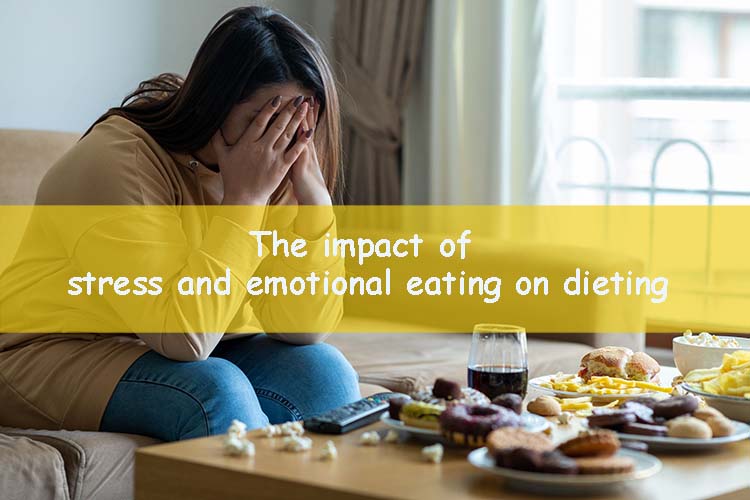Dieting is often regarded as a means to achieve weight loss and improve overall health. However, many individuals struggle to stick to their diets, and stress and emotional eating play a significant role in this challenge. In this blog post, we will explore the impact of stress and emotional eating on dieting, understand the underlying reasons behind these behaviors, and provide practical strategies to overcome them for a healthier, more sustainable approach to weight management.
Stress and its Effects on Eating:
- The Stress Response: When faced with stress, the body releases hormones like cortisol, triggering physiological changes that can impact food choices and eating behaviors.
- Stress Eating: Stress can lead to emotional eating, where individuals consume food as a coping mechanism rather than in response to true hunger cues. This behavior is often driven by a desire for comfort, distraction, or temporary relief from stress.
- Cravings and Food Preferences: Stress can also lead to cravings for high-calorie, sugary, or fatty foods, as these items can produce temporary feelings of pleasure and comfort.
Emotional Eating and its Impact on Dieting:
- Emotional Eating Triggers: Emotional eating is characterized by using food as a way to manage and regulate emotions, such as sadness, boredom, loneliness, or anxiety. It often occurs in response to specific feelings or situations.
- Mindless Eating: Emotional eating is often associated with mindless eating, where individuals consume food without being fully aware of their hunger or fullness levels.
- Negative Impact on Dieting Efforts: Emotional eating can sabotage dieting efforts by leading to overeating, consuming calorie-dense foods, and creating a vicious cycle of guilt and shame surrounding food choices.
The Connection Between Stress, Emotional Eating, and Weight Gain:
- Cortisol and Weight Gain: The stress hormone cortisol has been linked to weight gain, particularly around the abdominal area. Chronically elevated cortisol levels can also affect metabolism, appetite regulation, and fat storage.
- Calorie Consumption: People tend to consume more calories when experiencing stress or engaging in emotional eating, which can contribute to weight gain over time.
- Restrictive Diets and Emotional Eating: Restrictive diets may lead to increased vulnerability to emotional eating, as deprivation and restriction can trigger feelings of stress, leading to a cycle of emotional eating and unsuccessful dieting attempts.
Tips for Managing Stress and Emotional Eating while Dieting:
- Recognize Emotional Triggers: Identify your emotional triggers for eating, such as boredom, loneliness, or stress. Increase self-awareness to differentiate between true hunger and emotional cues.
- Seek Alternative Coping Mechanisms: Develop a repertoire of alternative coping strategies that do not involve food, such as exercising, engaging in hobbies, practicing mindfulness, or seeking support from friends and loved ones.
- Practice Mindful Eating: Pay attention to your physical hunger cues, slow down while eating, and savor each bite. Engaging in mindful eating can help prevent mindless emotional eating episodes.
- Build a Support System: Surround yourself with a supportive network of individuals who understand your goals and can provide encouragement and guidance throughout your weight management journey.
- Manage Stress: Incorporate stress management techniques into your daily routine, such as exercise, meditation, deep breathing exercises, or engaging in activities that bring you joy and relaxation.
- Establish Realistic Goals: Set achievable and realistic weight loss goals that do not rely solely on restrictive diets. Focus on creating lasting, sustainable lifestyle changes rather than short-term solutions.
Involving Professionals for Support:
- Seek Professional Guidance: If stress and emotional eating consistently undermine your dieting efforts, consider seeking guidance from a registered dietitian or a therapist specializing in eating disorders or emotional well-being.
- Cognitive-Behavioral Therapy (CBT): CBT can be beneficial in addressing emotional eating patterns by helping individuals identify and challenge negative thoughts and develop healthier coping mechanisms.
Conclusion:
Understanding the impact of stress and emotional eating on dieting is crucial for successful weight management and overall well-being. Both stress and emotional eating can derail dieting efforts, leading to weight gain, frustration, and a negative relationship with food. By recognizing emotional triggers, developing healthier coping mechanisms, practicing mindful eating, and seeking professional support when needed, individuals can break free from the cycle of stress and emotional eating, paving the way for a healthier lifestyle.
Remember, achieving sustainable weight loss involves addressing both the physical and emotional aspects of eating, allowing for a more balanced and fulfilling relationship with food.

